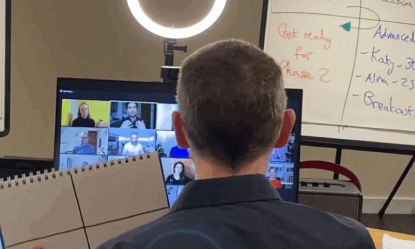“Learning how to say no confidently but politely can be empowering and can actually improve relationships with colleagues.”
7 Ways To Be A More Assertive Communicator
Do you feel like you’re not assertive enough when communicating? Do you lack confidence when speaking up in meetings or talking to your boss? If so, this blog post is for you!
In today’s world, it’s more important than ever to be able to communicate effectively if we want to be successful in business. If you’re not an assertive communicator, you may risk your ideas going unnoticed and people not valuing your judgement.
The good news is that assertiveness is simply a skill that you can master with practice. In fact, studies show that assertiveness training can help lower stress, anxiety and even depression.
To empower your language, we’ll give you some tips on how to assert yourself and boost your confidence.
Let’s get started!
Use positive affirmations
Our brain gives a running commentary of our day-to-day decisions. The trouble is that we tend to pay more attention to the negative self-talk in our heads, which is demoralising and can also make us more likely to fail.
Positive affirmations are a great way to counter this and boost your confidence.
Affirmations are positive statements used to challenge negative thoughts, which, when repeated, can help us adopt a more optimistic mindset and make us more resilient in the face of challenges.
Studies have shown that repeating positive affirmations over time can cause the brain to create new neural pathways in the part of the brain which is responsible for assessing risk and fear, processing emotion, decision making, memory and self-perception.
In other words, repeating positive affirmations causes physical changes in the brain, which can help to boost our feelings of confidence. Think of it as a gym session for your mind!
How to do it
Repeat empowering phrases to yourself before you go into a situation where you’ll need to speak in front of others. Here are some examples of positive affirmations:
- I am confident
- I am worthy of respect
- I am the right person to lead this team
- My opinion matters
Before your next meeting or presentation, try using positive affirmations beginning with ‘I am…’ and visualising your future success.
Speak with intention
When you’re communicating, be clear and concise with your words. Make sure you know what you want to say before you say it. It will help you come across as assertive and confident. Here are some tips for speaking with intention:
- Make eye contact with the person or people you’re talking to. Making eye contact shows you’re confident and engaged in the conversation.
- Slow down your speech. Taking time with your words helps with clarity of thought, and a slower pace is often associated with confidence and authority.
- Listen more than you speak. It helps you better understand the conversation and ensure that you’re on the same page as the other person. Pause before you reply to limit talking over the other person.
Avoid filler words
The next, um, thing to consider are filler words, you know?
Did you know that the average person giving a formal speech uses 3.62 filler words per minute? In a 30-minute presentation, that’s nearly 109 words or sounds that are superfluous and don’t add any real meaning to your sentence.
We often pepper our speech with filler words to fill in gaps when we’re unsure what to say or try to come across as more polite.
However, using filler words can make you sound uncertain and unconfident.
In November 2021, Prime Minister Boris Johnson’s speech to the Confederation of British Industry in South Shields went viral as he lost his place, using fillers such as ‘um’ and ‘forgive me’ to fill the silence.
Here are some examples of the most commonly-used filler words:
– like
– um / uh / em
– so
– you know
– I mean
– basically
– just
‘Just’ a quick example…
‘Just’ is one of the filler words we overuse to try and be polite.
How often have you asked ‘Can I just pick your brain?’ or written the words ‘I just wanted to email you…’?
Using the word ‘just’ in this way diminishes your worth. It can make you sound apologetic, and you doubt the validity of your statements or requests.
How to avoid using filler words
To help avoid using filler words, plan what you want to say in advance and rehearse it if you can.
Before you start speaking, take a breath to help you collect your thoughts. If you get stuck and forget where you are in your presentation, pause and take a breath – you’ll come across as a lot more confident and composed.
Don’t apologise
How often do you say sorry when you have nothing to apologise for?
As mentioned above, when we were talking about filler words and ‘just’, sorry is a word that immediately diminishes your self-worth and confidence.
Replacing sorry with “thank you” is a good strategy. Instead of “sorry to keep you waiting”, try “thank you for your patience”. Try “Is now a good time to chat?” instead of “sorry to bother you” when you need to have that crucial conversation with your colleague.
You can learn more about how to stop apologising in our blog post here.
Be Specific
If you want something to happen, you need to be clear about it in your conversations or meetings.
In business, we often feel the need to avoid conflict or awkwardness, and instead of asking direct, specific requests, we beat around the bush or hope that the other person will read between the lines and work out what we want.
At best, this wastes time, and at worst, it can mean that the other person leaves the conversation not knowing what you want or why you’re taking up their time.
Communicating your needs or wants clearly to the other person will help them understand your requests and put you in a much better position when it comes to negotiating.
Instead of being apologetic, try to articulate what you want as directly as possible. It’s in everybody’s best interest for you to be specific and transparent about what you need.
Learn to say ‘no’
Saying ‘no’ at work can be challenging.
Why does it feel so hard? We want to be liked. We don’t want to disappoint our colleagues or managers, and we want to avoid conflict. Saying no can make us feel guilty and that we’re at risk of damaging relationships.
But learning how to say no confidently but politely can be empowering and can actually improve relationships with colleagues.
Video marketing coach Virginia Kerr has clocked up more than 9.8 million likes on Tiktok for her ‘People Pleasers Express’ – a comedy advice column that gives tips on practising saying ‘no’ in different business scenarios.
Kerr advises using role-play of saying no in different scenarios to become more used to saying it confidently. If you’re worried about coming across as rude, she suggests using the word ‘because’:
e.g.
“No, I won’t be able to file that report by Thursday because I’ve got two others that I need to prioritise before then.” (Remember, don’t apologise!)
If you use the word ‘because’ after saying no and then giving a reason, people will see you as more agreeable, not less, so don’t be afraid of pushing back.
Learn how to handle objections confidently
Knowing how to handle objections or difficult questions can hugely increase your confidence and assertiveness when speaking.
Often when an objection is thrown our way, we panic and risk going into a defensive or apologetic mode, which can diminish our authority.
Learning how to deal with objections using empathy and careful questions can empower you to stay in control of the situation and give you that valuable thinking time to find the right thing to say every time. Knowing what to do will make you look and feel more confident and assertive.
You can read more about objection handling on our blog here.
Being assertive doesn’t mean being aggressive. It’s simply about having the confidence to assert your opinion and communicate effectively. By following these tips, you’ll be well on your way to empowering your language!
Liked this blog? You might also like:
What is Assertive Communication? How to Master it Effectively?
How to look and feel more confident – even if you’re not
How to control your anxiety before giving a big presentation
Can we help you with your communication skills training? We run fun and interactive courses, workshops and masterclasses to increase your team’s confidence, influence and authority. Check them out here.



















